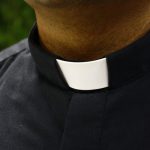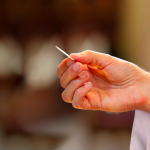Government Places Religion Ahead of Child Protection

Leaders of victims’ and child protection groups have echoed accusations by Greens MP David Shoebridge that the Berejiklian government is being dictated “by the religious right,” after it neglected to adopt recommendations by the Child Abuse Royal Commission to remove ‘seal of confession’ laws, which protect priests against prosecution for failing to report evidence of child sexual abuse by their colleagues and others, and which enable them to avoid complying with subpoenas to give evidence in NSW.
“Abolishing the secrecy of the confessional was one of the most important recommendations from the Royal Commission… by failing to remove the seal of the confessional, the government has shown just how captured it is by the religious right in its ranks,” Mr Shoebridge remarked.
“This shows a real lack of courage from the government, children must be protected ahead of the interests of any church or religion and that means abolishing the ‘sanctity’ of the confession.”
In its final report, the Commission recommended that state and territory governments introduce laws requiring religious ministers to report information about child sexual abuse revealed to them – effectively abolishing the ‘seal of confession’ which has historically allowed priests to avoid disclosing such information.
The recommendation has caused divisions among the Australian Catholic Church leadership, especially those who feel their religious duties – including the supposed duty to hide heinous sexual crimes against children – are more important than any obligation to protect children, let alone the law of the land.
On Easter Sunday, for example, Sydney Catholic Archbishop Anthony Fisher made it clear Catholic leaders would keep the lid on the seal of confession regardless of what the law says, or the information received.
“This precious sacrament (confession), too, is threatened today both by neglect and attack… But priests will, we know, suffer punishment, even martyrdom, rather than break the seal of confession” he told followers, adding:
“For Confession is a privileged encounter between penitent and God; here the Christian enters the silence and secrecy of the Tomb, to be re-Eastered; and no earthly authority may enter there.”
It should be borne in mind that such defiance is in the context of the Royal Commission hearing evidence that at least 4,444 children have been subjected to sexual abuse in Australia Catholic institutions alone.
Pushing aside the issue
Rather than flatly rejecting the recommendation, premier Berejiklian has instead said the issue will be “deferred” and dealt with through the Council of Australian Governments, a national body made up of each State Premier, Territory First Minister, and the Prime Minister.
“Our response to that recommendation is to take it through the COAG process, we believe that is the best way to deal with it,” she remarked.
“They’re complex issues that need to be balanced with what people believe to be religious freedoms”.
Many see this as a way of pushing the issue to the side, rather than making decisions that might offend the religious right.
What Is The Seal Of Confession?
In the Catholic Church, the ‘seal of confession’ is the duty of priests not to disclose information they obtain during the course of a confession. Priest can face disciplinary action or even excommunication for breaking this seal.
In NSW, this religious law is recognised through Section 127 of the Evidence Act which states:
“A person who is or was a member of the clergy of any church or religious denomination is entitled to refuse to divulge that a religious confession was made, or the contents of a religious confession made, to the person when a member of the clergy.”
Similar laws exist in Victoria, the Northern Territory, Tasmania and the Commonwealth.
While the language of section 127 is broad enough to cover all faiths, it has little relevance to religions such as Judaism and Islam, which do not practice the confession.
Some Christian denominations, including the Anglican Church, have decided to ‘opt-out’ of the Act’s protection – so, ironically, the section protects members of the denomination responsible for committing, enabling and covering up the vast majority of sexual assaults against children– Catholics.
The seal protects child abusers
The Royal Commission heard several accounts of confessional evidence of child sexual assault not being reported to authorities.
Peter Gogarty, an advocate for victims of child sexual abuse, recalls being abused by a Catholic priest as a boy and informing another priest during a confessional.
“Nothing was ever done about the priest, nothing was ever done to support me, and the tragedy is that as we speak today, that could happen to any child that goes into a Catholic confessional,” Gogarty stated.
“No-one in this country, for any reason, should be exempt from our civil laws and that applies doubly to the Catholic Church and Anglican Church who have shown not to be worthy of the privileges they’ve been given.”
Of course, the protection of the seal will also ensure other evidence of historical child sexual abuse remains hidden.
Other reforms are ok
Meanwhile, Berejiklian announced her government will be adopting more than 50 of the 88 recommendations made by the Royal Commission in November 2017.
“These historic reforms are designed to deliver survivors the justice they deserve and impose tougher penalties on offenders for their appalling abuse of children,” the Premier said.
“NSW continues to lead the nation in its response to the Royal Commission by introducing one of the state’s largest ever criminal reform packages.”
The reforms include:
- Legislating a maximum life sentence for a strengthened offence of persistent child sexual abuse;
- Introducing new offences for failure to report and failure to protect against child abuse;
- Requiring courts sentencing historic child sexual assault offences to apply current sentencing standards and the present understanding about the lifelong effects of sexual abuse on children;
- Requiring courts not to take into account an offender’s good character when sentencing for historic offences where their reputation facilitated the offending; and
- Introducing a new offence of grooming an adult to access a child and strengthening the grooming offence to include providing a child with gifts or money.
According to Attorney General Mark Speakerman, enabling legislation will be introduced to NSW Parliament in coming months, with the government’s full response to the Royal Commission to be delivered in June.
“The Royal Commission has generated unprecedented community understanding of child sexual abuse and the harm it causes,” Speakman stated.
“It is vital we strengthen our laws so they better reflect community expectations, protect children, and help survivors find justice.”
Support for survivors is available through Lifeline 13 11 14, 1800 Respect on 1800 737 732, Blue Knot Foundation on 1300 657 380 or MensLine Australia on 1300 789 978.







